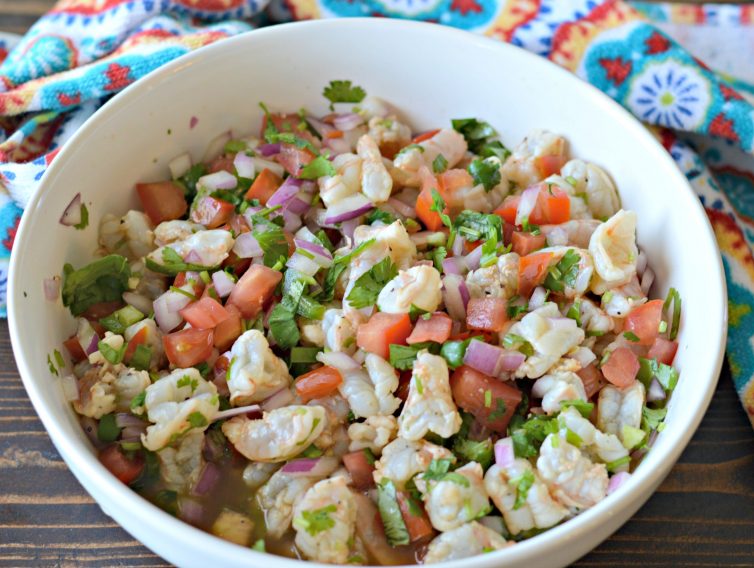Hey there! I’ve been making and eating ceviche for years, and I totally get why people wonder if the shrimp is actually raw. Let me break down everything you need to know about this amazing dish that’s taking over restaurant menus everywhere!
The Quick Answer
Nope, shrimp in ceviche isn’t technically raw! While it’s true we don’t use heat to cook it, the citrus juice does something pretty cool – it chemically “cooks” the shrimp through a process called denaturation. Pretty neat, right?
How Does Citrus “Cook” the Shrimp?
Here’s what happens when you make ceviche
- The acid in lime/lemon juice causes the proteins in shrimp to unwind
- This makes the shrimp turn opaque and firm up
- The texture becomes similar to heat-cooked shrimp
- The process takes about 30 minutes to 4 hours
Safety First: Important Tips
Look, I wanna make sure you’re making ceviche safely. Here’s what you gotta do:
1. Choose the Right Shrimp
- Use super fresh, high-quality shrimp
- Get it from a trusted source
- Previously frozen shrimp is actually great (helps kill parasites!)
2. Proper Marinating
- Minimum 30 minutes in citrus juice
- Best results: 1-4 hours
- Make sure shrimp is fully submerged
- Keep refrigerated while marinating
3. Watch for Doneness
The shrimp is “cooked” when
- It’s completely opaque
- Feels firm to touch
- No translucent parts remain
My Favorite Quick Ceviche Recipe
Here’s my go-to recipe that never fails to impress:
Ingredients:
- 1 pound fresh shrimp, peeled and deveined
- 1 cup lime juice (about 8 limes)
- ½ cup lemon juice
- 2 tablespoons orange juice
- 1 red onion, diced
- 2 tomatoes, diced
- 1 jalapeño (remove seeds if you’re not into spicy)
- 1 avocado
- Fresh cilantro
- Salt and pepper to taste
Instructions:
- Mix citrus juices in a bowl
- Add shrimp, make sure it’s covered
- Refrigerate 30-60 minutes
- Add remaining ingredients
- Season to taste
- Serve with tortilla chips
Common Questions I Get Asked
Q: Can I use pre-cooked shrimp?
A: I wouldn’t recommend it – pre-cooked shrimp gets rubbery in the marinade. Stick with raw!
Q: How long can I keep it?
A: Best eaten fresh, but will keep in fridge for up to 24 hours. Though honestly, it never lasts that long at my house!
Q: Is it safe for everyone?
A: Not recommended for pregnant women or people with weakened immune systems. When in doubt, you can always briefly poach the shrimp first!
Pro Tips from My Kitchen
- Use a glass or non-reactive bowl – metal can affect the taste
- Dice everything roughly the same size for the best eating experience
- Add avocado just before serving to prevent browning
- Save some cilantro for garnish – makes it look fancy!
Health Benefits
Shrimp ceviche isn’t just tasty – it’s pretty good for you too! One serving (about 1 cup) typically contains:
- 98 calories
- 6.5g protein
- 4g healthy fats
- 3g fiber
- Low in carbs
- High in vitamins and minerals
Wrapping It Up
So there ya have it! Shrimp ceviche isn’t raw, but it’s not traditionally cooked either. It’s this amazing middle ground that gives us one of the most refreshing dishes perfect for hot summer days. Just remember to use fresh ingredients and give it enough time in the citrus juice, and you’ll be enjoying restaurant-quality ceviche at home!
Happy cooking, everyone! Drop me a comment if you try making it – I’d love to hear how it turned out!
Would you like me to explain or break down any part of this article further?

Nutritional analysis per serving
- Calories 98
- Total carbohydrate 9 g
- Total sugars 2 g
- Added sugars 0 g
- Dietary fiber 3 g
- Protein 6.5 g
- Total fat 4 g
- Saturated fat 0.5 g
- Trans fat trace
- Monounsaturated fat 2.5 g
- Polyunsaturated fat 0.5 g
- Cholesterol 36 mg
- Sodium 166 mg
- Potassium 244 mg
- Calcium 38 mg
- Magnesium 29 mg
- Vitamin D 0.5 IU
- Iron 1 g
- Protein and dairy 1
- Meats, poultry and fish 1
- Nuts, seeds and dry beans 1/2
Created by the chefs at Mayo Clinics Dan Abraham Healthy Living Center.
Mayo Clinic does not endorse companies or products. Advertising revenue supports our not-for-profit mission.
Check out these best-sellers and special offers on books and newsletters from Mayo Clinic Press.
